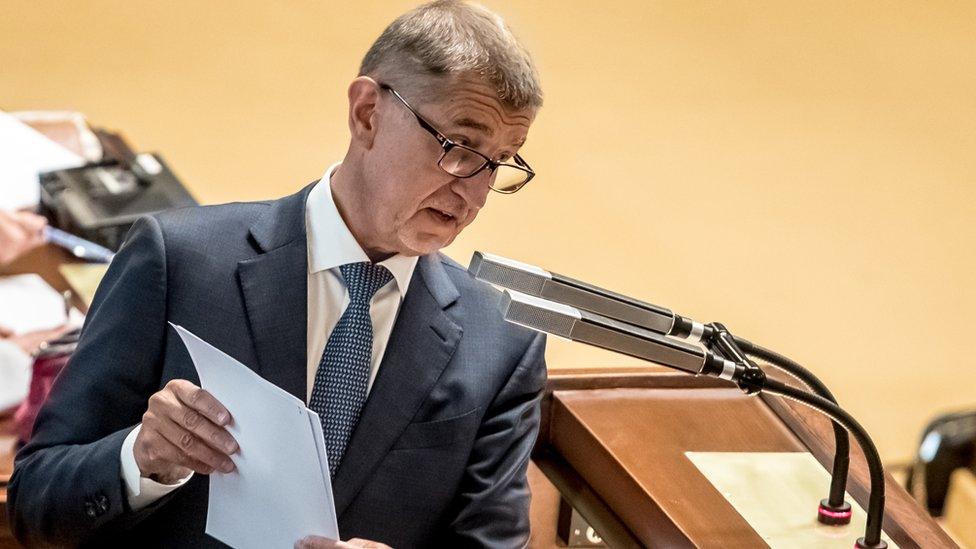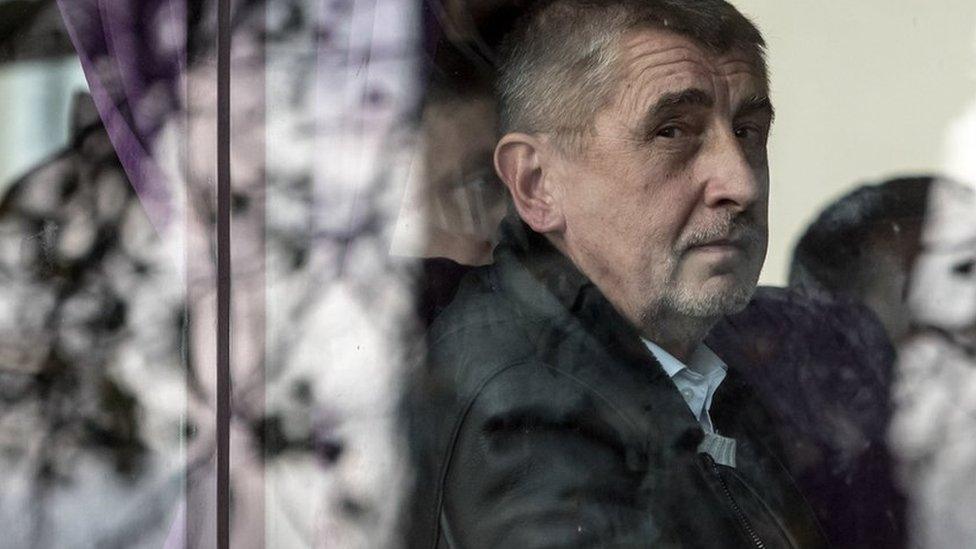Prague anti-PM protest 'biggest since end of communism'
- Published
In June, protesters called for Mr Babis' resignation in a mass rally in Prague
Tens of thousands of people have protested in the Czech capital, Prague, calling for the resignation of Prime Minister Andrej Babis, who is accused of fraudulent use of EU subsidies.
Organisers said as many as 120,000 were attending Tuesday's rally.
If confirmed that would make it the biggest since the fall of communism during the 1989 Velvet Revolution.
Mr Babis denies fraud and has attacked a draft EU report demanding the return of millions of euros in subsidies.
Who is demonstrating?
The "million moments for democracy group" has staged rallies every week since the end of April, with an estimated 50,000 people joining a protest in Prague's Wenceslas Square a fortnight ago.
The organisers said they had more than doubled that number on Tuesday, which would make it the biggest protest for 30 years.
As protesters held up pictures of Mr Babis with the simple message "resign", speakers addressed the crowd in front of a backdrop reading "prime minister or crime minister?".

Will the protests change things?
Rob Cameron, BBC News in Prague
Estimating crowds is an inexact science, but a sea of faces stretched right down from the statue of St Wenceslas to the bottom of Prague's longest square.
The protesters carried placards and shouted slogans calling on Mr Babis to resign and take his recently appointed justice minister with him. They're worried she will frustrate the ongoing criminal prosecution against him.
But while the crowds are huge and growing, their potential to bring about change is debatable. Mr Babis refuses to resign, the president says he won't fire him even if he is formally charged by prosecutors, and his junior coalition partner seems unwilling - so far - to desert him.

Why are they angry?
Andrej Babis is the Czech Republic's second richest individual and a former communist.
He came to power in 2017 at the head of the populist ANO (Yes) party on an anti-corruption and Eurosceptic platform, forming a minority government with the left-wing Social Democrats.
Despite the campaign to oust him, his ANO party came first in the European elections, external last month, with 21.2% of the vote.

Mr Babis has attacked the allegations against him as a smear
In April, police proposed that Mr Babis be charged with EU subsidy fraud, an allegation he has rejected. The justice minister resigned and was replaced by Marie Benesova, who has since become a target for protesters too.
Then a European Commission draft report was leaked last Friday which concluded he should return millions of euros in subsidies.
Mr Babis, 64, had transferred his Agrofert conglomerate to two trust funds two months before he came to power in 2017. The group has interests in food, chemicals and media.
But the 71-page Commission audit found that he was still making profits from the group, because he was the sole beneficiary of the trust funds, and said all EU subsidies received by the company should be returned.
The leaked report said the prime minister had "a decisive influence" over the trust funds and was in conflict of interest.
It estimated the total amount to be paid back at 451m Czech koruna (€17.5m; £15.5m).
When the leaked report emerged, Mr Babis condemned it as a "filthy lie".
What has the media reaction been?
Czech media outlets have appeared favourable towards the protests, BBC Monitoring writes.
The liberal weekly Respekt said the organisers - the "million moments for democracy group" - had given "a voice to people who felt like nobody hears them".
Praising the scale of the protest, it added that organisers would still have been considered successful if few had showed up, "because they acted according to their conscience and tried to change something".
The business-oriented newspaper Hospodarske Noviny compared the behaviour of Mr Babis to that of his Hungarian counterpart, Viktor Orban: "For his personal benefit, Babis is turning into a tough anti-EU populist, with all the dark consequences this might have for the Czech Republic."
The website of state-owned iRozhlas expressed doubt that the protests would force Mr Babis to step down.
However, the two papers that Mr Babis owns through a trust fund, Mlada Fronta Dnes and Lidove Noviny, appeared to avoid publishing commentaries on either the protest or Mr Babis's confrontation with the EU.
- Published20 October 2017
